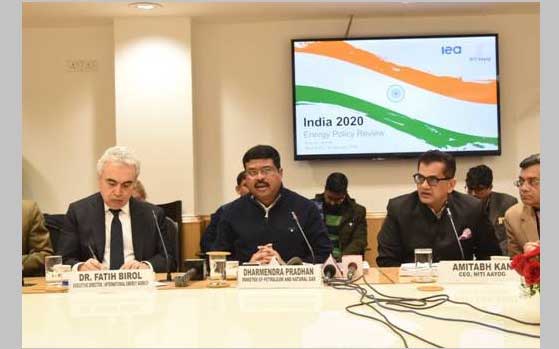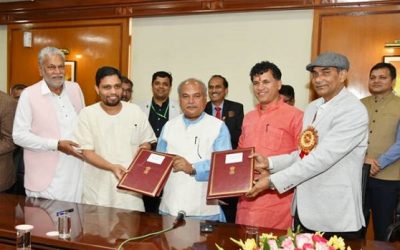In-depth Review of India’s Energy Policies report by International Energy Agency (IEA) was launched in New Delhi today by Dharmendra Pradhan, Minister of Petroleum and Natural Gas & Steel, Pralhad Joshi, Minister of Coal, Mines and Parliamentary Affairs, Raj Kumar Singh, Minister of State (I/C) for Power and New and Renewable Energy, Rajiv Kumar, Vice Chairman, Niti Aayog, Ambassadors, Dr Fatih Birol, Executive Director, International Energy Agency, and Amitabh Kant, CEO, Niti Aayog.
Thanking Dr. Fatih Birol and his IEA team for coming up with a comprehensive Report covering India’s energy sector in its entirety, Pradhan said that IEA’s findings are a vindication of the significant advances made in realizing the energy vision enunciated by Prime Minister Narendra Modi, anchored by Energy Access, Energy Efficiency, Energy Sustainability and Energy Security, with Energy Justice at its core.
Pradhan said that India is now the third largest energy consumer in the world. India is in the midst of a major transformative shift in its energy sector. The energy polices already put in place by the Government and also those on the anvil, clearly demonstrate our determination to embrace this energy transition in a sustainable and responsible manner.

Pradhan said India is now the third largest energy consumer in the world. Pix: PIB
The Minister said that a number of path breaking initiatives launched by Indian Government since 2015, have redefined India’s commitment to sustainable energy. “Our key challenge as a developing country, with per capita energy consumption below the global average, is to meet the growing demand for energy. India made great strides in recent years towards achieving universal access to modern energy, including clean cooking and electricity, affordable, secure and cleaner energy for its people. The Report captures well the progress made in achieving sustainable energy for all, as reflected in the UN Sustainable Development Goal 7 (SDG 7). It does also highlight the persisting challenges to be focused in the coming days,” he added.
Talking about the Ujjwala Yojana, Pradhan said that the remotest corners of India have been touched for cleaner fuel access under it. “We are also sharing our experience with our friends in Africa and Asia to enable them to benefit from the best practices in promotion of LPG. I do recognize that we have more ground to cover and also to ensure that the initiatives are implemented for achieving universal coverage in the country,” the Minister said.
Pradhan said that India’s transformation to a gas-based economy and developing indigenously produced biofuels, apart from renewable energy and energy efficiency measures, can potentially achieve the much-needed carbon reductions. As part of the energy transition, decarbonisation of the energy sector is picking up momentum in India. “Given India’s development imperative, our thrust is on building oil and gas infrastructure to ensure access to affordable energy to all our citizens. The report notes that India is moving towards a gas-based economy,” he said.
Pradhan said that an estimated investment of 100 billion dollar in oil and gas infrastructure has been lined up. The gas pipeline network will soon be covering the length and breadth of the country; from Kutch in Western India to Kohima in the East, and from Kashmir in the North to Kanyakumari in the South. “In yet another important decision, our Government has approved viability Gap Funding/ Capital Grant at 60 percent of the estimated cost of Rs 9265 crore for the North East gas grid project to develop gas pipeline grid of 1656 Km in the eight States of the North-eastern region,” he said.
The Minister said that We are aggressively working to build City Gas Distribution Network covering more than 400 districts of India. This network will serve 72% of India’s population with cleaner and affordable gas over more than 50 % of India’s geography. Talking about the proposed Workshop on Natural Gas on 23 January in New Delhi, he said that it will bring together for the first time all relevant stakeholders under one roof. “I am confident that these initiatives in the gas sector would bring about a transformative change in India’s energy landscape,” Pradhan said.
The Minister said that the Report acknowledges Government’s efforts in making energy security as a prime policy priority, and recognizes the efficiency achieved due to Government’s relentless march in undertaking tectonic reforms in the energy sector and continued pursuit of market-based solutions. He said “We have taken note of IEA’s recommendation for reinforcement of India’s oil emergency response policy. Enhancing international engagement on global oil security issues is already an active goal being pursued by my Ministry. Energy has become an essential commodity in our bilateral trade engagements with several key trading partners and in positioning India as an important strategic player in global energy landscape.”
Talking about the diversification of oil sources and development of alternate resources of energy as such bio-fuel, he said that these are being undertaken on an accelerated mode. “We are on the way to achieve 20% ethanol blending in petrol and 5% bio-diesel in diesel by 2030. Indeed, to promote energy sustainability, our new National Biofuel policy focuses on waste-to-wealth creation and targets to generate various types of bio-fuels from agriculture residue and municipal waste,” Pradhan said.
Expressing deep concerned about the crude oil price volatility, the Minister said that today, we are meeting in the backdrop of rising tensions in the Middle East and its impact on stability and security in the region.
He said “We have taken several measures to ensure investor friendly environment. IEA has noted that during the period 2015 to 2018, investments in the energy sector in India recorded the second highest growth in the world. We are happy that global oil and gas majors like Saudi Aramco, ADNOC, BP, Shell, Total, Roseneft and ExxonMobil are making their significant presence in India.”
News source: PIB.










0 Comments